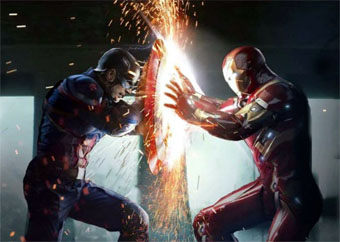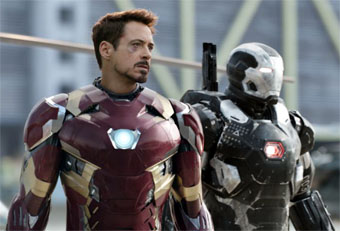
Images courtesy of Marvel Studios/Marvel Entertainment
Captain America:
Civil War
| published June 13, 2016 |
By Maggie Nichols, Thursday Review contributor
The summer season of the cinema blockbuster has already begun in earnest, with all the usual pitting of one movie against another—Angry Birds and Teenage Mutant Ninja Turtles 2 being the two most obvious for general audiences made up largely up people under the age of 12 (or their parents).
For those of us over the age of 18, the summer film battles have already begun with a war raging between two of the great comic book-cartoon TV factions with two of the most expensive late-spring releases, Captain America: Civil War versus X-Men: Apocalypse. Diehards of one or the other seem to deride the opposition in strident, mocking terms. This is not politics, as in Clinton versus Trump, or even marketing, as in Pepsi versus Coke. This is war, as both film titles would suggest. Each movie is meant to press us to the brink of destruction.
In polite company and among friends and students, I’ve already learned the hard way to keep my big mouth shut and simply offer mild praise of both movies, avoiding weighing-in with a specific opinion about which one is better. However, this venue being Thursday Review, which never shrinks or fades when controversy is abundant, I will throw my hat into the ring (in truth, I don’t wear hats) and offer the modest opinion that Captain America: Civil War is modestly entertaining and enjoyable, but lacks the historical crackle and sparkle offered by X-Men (which I may review at some later point).
Short version: Captain America: Civil War is about more government versus less government, federal regulation versus no regulations, United Nations supervision versus individual conscious answerable to humanity.
Long version: in this Marvel venue, the general public and the political establishment wage a war over the seemingly unchecked power of super heroes. Mass concern and intense media pressure spurs Washington to consider draconian legislation to regulate—and sharply curtail—the actions of super heroes and masked avengers with extra-human powers through congressional legislation (and a U.N. resolution) called the Hero Registration Act. In other words, super heroes would have to answer directly to a federal authority, or to the President, or to officials at the U.N. to eliminate unnecessary damage to infrastructure, businesses, or cities through the unilateral deeds of people with super strength.
This triggers a philosophical division among the major super heroes, some favoring the use of government regulation, others opposing it, with all the usual concerns over how much—and under what circumstances—should people (or vigilantes) trust the government. Tony Stark, also known as Iron Man, leads the cabal in favor of incorporating super hero actions into a centralized, federally-managed role: better to legitimize the activity, fold those actions into the democratic processes, and even introduce shared innovations and economies of scale. Steve Rogers, also known as Captain America, leads the cadre of heroes opposed to government or Pentagon control: he believes that super hero activity will soon enough—even inevitably—be channeled for the self-serving, pocket-lining and even malicious purposes of shameless politicians and corporate interests. Better to act as independent agents for the greater good, and remain above (or outside of) politics. (Amusing scenario: imagine Hillary Clinton, Donald Trump, or Bernie Sanders harnessing the powers of Ant Man, the Hulk, Black Widow, or Falcon; what sort of chaos might ensue?)
Thus two sets of super heroes who call themselves Avengers joust for control of their own already complex narratives amidst widespread fear of massive damage and destruction to cities across North America, and against a variety of subplots made of old lies, secret vendettas, frame-ups, murders, and political conspiracy.
If this movie plot seems vaguely familiar, it’s because the 2009 film The Watchmen, directed by Zack Snyder and based on the mid-1980s comics and graphic novels of Dave Gibbons and Alan Moore, explores a similar theme: the government takes it one step further, not merely settling on federal regulation of vigilantes, but forcing them into retirement, insisting that they remove their zany costumes, and legislating that their special powers be used only through carefully-managed government-defense-corporate collaborations. It’s a darker, more cynical venue—an alternate Cold War reality-history world in which the U.S. wins its war in Vietnam, repeals terms limits on Presidents, re-elects Richard Nixon to a fourth term even as the world comes to within inches of nuclear obliteration.
Still, the theme of channeling super hero/masked avenger skillsets into political-civilian controls is common in the comic book world in which a single temper tantrum by The Hulk could result in a billion dollars’ worth of damage and a month of sweeping up broken glass.
Captain America: Civil War effectively pits those who value autonomy, independence and their own consciences to guide their super heroics, against those who prefer the collaborative aspects of White House, Pentagon or United Nations control and supervision. A war of words quickly devolves into a war of strength and weapons, triggered by an assassination at the United Nations—blamed initially on Winter Soldier, a friend and ally of Captain America.
Into that breach, not surprisingly, moves a powerful new collective enemy and super villain ready to exploit the divisions between Avengers and society.

The cast performs well, with all the recently rebooted characters portrayed by the appropriate actors and actresses: Robert Downey, Jr. as Iron Man, Chris Evans as Captain America, Scarlett Johansson as Black Widow, Anthon Mackie as Falcon, Jeremy Renner as Hawkeye, Sebastian Stan as Winter Soldier, Elizabeth Olsen as Scarlett Witch, and Paul Rudd as Ant Man. We also get a brief introduction to a young Spider Man played by Tom Holland.
I will not engage in spoilers, so no need here for a spoiler alert. In short: Captain America: Civil War is well worth the movie ticket price if you enjoy such big screen spectacles at the theater, as opposed to on a premium channel or Netflix later. More about its closest box office rival, X-Men, next week.
Related Thursday Review articles:
Star Wars The Force Awakens; Michael Bush; Thursday Review; December 26, 2015.
Avengers: Age of Ultron; Isaac Fink; Thursday Review; May 13, 2015.
